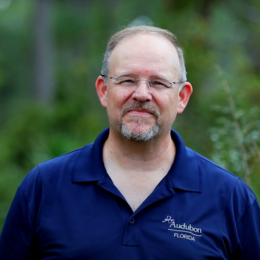Beach-nesting and other coastal birds have begun laying eggs along Florida's coasts. Spring and summer mark critical times of year for these threatened species, as they must try to find safe habitats away from human disturbance, storms, and predators to successfully raise their chicks.
Because these species nest directly on the sand and shell shoreline, it is important for beachgoers and boaters to heed nesting signage and avoid areas posted as "no trespassing," even if they don't notice any birds. Audubon reminds birders and photographers to give nesting parents their space – approaching too closely can cause birds to flush, exposing their chicks and eggs to hot temperatures and predators.
“If we work together, we can protect these vulnerable nesting families so that they can raise the next generation of sea and shorebirds,” says Chris Farrell, Audubon Northeast Florida Policy Associate.
Audubon staff work with resource managers and volunteers to install several miles of string, flagging, and informational signs in several areas.
For example, in Northeast Florida, Huguenot Memorial Park hosts a large number of sea and shorebirds every nesting season, and staff there close part of the beach to keep bird babies safe.
How to help beach-nesting birds:
- Respect posted areas, even if you don’t see any birds inside.
- If birds dive-bomb you, carefully move away as there may be a nest or chicks nearby.
- Ensure no trash or food remnants are left behind, as this can attract predators.
- Keep dogs off the beach, on board your boat, or at home.
- Remain alert for rooftop nesting colonies in coastal areas.
- Consider joining our volunteer bird stewardship flock! Visit fl.audubon.org/bird-stewards.
Audubon Florida protects birds and the places they need, today and tomorrow. Audubon works throughout the Americas using science, advocacy, education, and on-the-ground conservation. State programs, nature centers, chapters, and partners give Audubon an unparalleled wingspan that reaches millions of people each year to inform, inspire, and unite diverse communities in conservation action. A nonprofit conservation organization since 1900, Audubon believes in a world in which people and wildlife thrive. Learn more at Fl.Audubon.org.






